6 books about Fairfax, Daniel
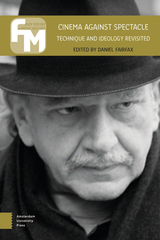
Cinema Against Spectacle
Technique and Ideology Revisited
Jean-Louis Comolli
Amsterdam University Press, 2014
Jean-Louis Comolli’s six-part essay Technique and Ideologyhad a revolutionary effect on film theory and history when it first appeared in Cahiers du Cinéma in 1971. In 2009, Comolli revisited his earlier text, arguing that the present age, marked by the total dominance of media-filtered spectacle over image production, makes the need for an 'emancipated, critical spectator' more pressing than ever. In this volume, Daniel Fairfax presents annotated translations of these two texts to provide an overview of Comolli’s activity as both a theorist and a filmmaker.
[more]
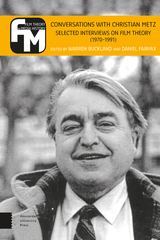
Conversations with Christian Metz
Selected Interviews on Film Theory (1970-1991)
Edited by Warren Buckland and Daniel Fairfax
Amsterdam University Press, 2018
From 1968 to 1991 the acclaimed film theorist Christian Metz wrote several remarkable books on film theory: Essais sur la signifi cation au cinéma, tome1 et 2; Langage et cinéma; Le signifiant imaginaire; and L’Enonciation impersonnelle. These books set the agenda of academic film studies during its formative period. Metz’s ideas were taken up, digested, refined,reinterpreted, criticized and sometimes dismissed, but rarely ignored.This volume collects and translates into English for the first time a series of interviews with Metz, who offers readable summaries,elaborations, and explanations of his sometimes complex and demanding theories of film. He speaks informally of the most fundamental concepts that constitute the heart of film theory as an academic discipline — concepts borrowed from linguistics, semiotics, rhetoric, narratology, and psychoanalysis.Within the colloquial language of the interview, we witness Metz’s initial formation and development of his film theory. The interviewers act as curious readers who pose probing questions to Metz about his books, and seek clarification and elaboration of his key concepts. We also discover the contents of his unpublished manuscript on jokes, his relation to Roland Barthes, and the social networks operative in the French intellectual community during the 1970s and 1980s.
[more]
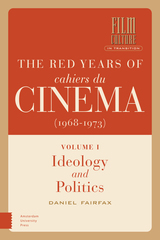
The Red Years of Cahiers du cinéma (1968-1973)
Volume I, Ideology and Politics
Daniel Fairfax
Amsterdam University Press, 2021
The uprising which shook France in May 1968 also had a revolutionary effect on the country's most prominent film journal. Under editors Jean-Louis Comolli and Jean Narboni, Cahiers du cinéma embarked on a militant turn that would govern the journal's work over the next five years. With a Marxist orientation inspired by the thinking of Louis Althusser, Jacques Lacan and Roland Barthes, the "red years" of Cahiers du cinéma produced a theoretical outpouring that was formative for the establishment of film studies as an academic discipline in the 1970s, and is still of vital relevance for the contemporary audiovisual landscape. It was also the seminal experience for a generation of critics who have dedicated the following half-century to the task of critically responding to the cinema.
The Red Years of Cahiers du Cinéma (1968-1973) gives a historical overview of this period in the journal's history, combining biographical accounts of the critics who were involved with Cahiers in the post-1968 and theoretical explorations of the text they wrote.
[more]
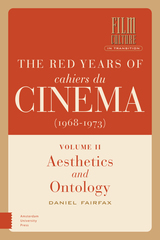
The Red Years of Cahiers du cinéma (1968-1973)
Volume II, Aesthetics and Ontology
Daniel Fairfax
Amsterdam University Press, 2021
The uprising which shook France in May 1968 also had a revolutionary effect on the country's most prominent film journal. Under editors Jean-Louis Comolli and Jean Narboni, Cahiers du cinéma embarked on a militant turn that would govern the journal's work over the next five years. With a Marxist orientation inspired by the thinking of Louis Althusser, Jacques Lacan and Roland Barthes, the "red years" of Cahiers du cinéma produced a theoretical outpouring that was formative for the establishment of film studies as an academic discipline in the 1970s, and is still of vital relevance for the contemporary audiovisual landscape. It was also the seminal experience for a generation of critics who have dedicated the following half-century to the task of critically responding to the cinema.
The Red Years of Cahiers du Cinéma (1968-1973) gives a historical overview of this period in the journal's history, combining biographical accounts of the critics who were involved with Cahiers in the post-1968 and theoretical explorations of the text they wrote.
[more]
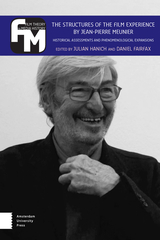
The Structures of the Film Experience by Jean-Pierre Meunier
Historical Assessments and Phenomenological Expansions
Julian Hanich
Amsterdam University Press, 2019
For the first time this volume makes Jean-Pierre Meunier’s insightful thoughts on the film experience available for an English-speaking readership. Introduced and commented by specialists in film studies and philosophy, Meunier’s intricate phenomenological descriptions of the spectator’s engagement with fiction films, documentaries and home movies can reach the wide audience they have deserved ever since their publication in French in 1969.
[more]
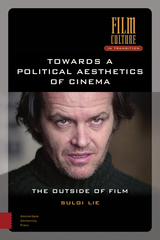
Towards a Political Aesthetics of Cinema
The Outside of Film
Sulgi Lie
Amsterdam University Press, 2020
Towards a Political Aesthetics of Cinema: The Outside of Film is a contribution to an aesthetics of cinema rooted in Marxist theory. Rather than focusing on the role that certain films, or the cinema as an institution, might play in political consciousness, the book asks a different question: how can the subject of politics in film be thought? This problem is presented in a systematic-theoretical rather than historical manner. The main aim of this book is a retrospective rehabilitation of the psychoanalytical concept of "suture," whose political core is progressively revealed. In a second step, this rereading of "suture"-theory is mediated with the Marxist aesthetics of Fredric Jameson. From the perspective of this reconfigured aesthetics of negativity, films by Hitchcock, Antonioni, Haneke and Kubrick are analyzed as articulations of a political unconscious.
[more]
READERS
Browse our collection.
PUBLISHERS
See BiblioVault's publisher services.
STUDENT SERVICES
Files for college accessibility offices.
UChicago Accessibility Resources
home | accessibility | search | about | contact us
BiblioVault ® 2001 - 2024
The University of Chicago Press









